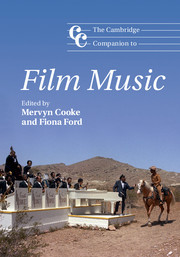Description
The Cambridge Companion to Film Music
Cambridge Companions to Music Series
Coordinators: Cooke Mervyn, Ford Fiona
A stimulating and unusually wide-ranging collection of essays overviewing ways in which music functions in film soundtracks.
Language: English
The Cambridge Companion to Film Music
Publication date: 12-2016
Support: Print on demand
Publication date: 12-2016
Support: Print on demand
The Cambridge Companion to Film Music
Publication date: 12-2016
Support: Print on demand
Publication date: 12-2016
Support: Print on demand
Description
/li>Contents
/li>Biography
/li>
This wide-ranging and thought-provoking collection of specially-commissioned essays provides a uniquely comprehensive overview of the many and various ways in which music functions in film soundtracks. Citing examples from a variety of historical periods, genres and film industries - including those of the USA, UK, France, Italy, India and Japan - the book's contributors are all leading scholars and practitioners in the field. They engage, sometimes provocatively, with numerous stimulating aspects of the history, theory and practice of film music in a series of lively discussions which will appeal as much to newcomers to this fascinating subject as to seasoned film music aficionados. Innovative research and fresh interpretative perspectives are offered alongside practice-based accounts of the film composer's distinctive art, with examples cited from genres as contrasting as animation, the screen musical, film noir, Hollywood melodrama, the pop music and jazz film, documentary, period drama, horror, science fiction and the Western.
Introduction Mervyn Cooke and Fiona Ford; Part I. Making Film Music: 1. Evolving practices for film music and sound, 1925–35 James Buhler and Hannah Lewis; 2. 'Pictures that talk and sing': sound history and technology David Cooper; 3. The composer and the studio: Korngold and Warner Bros. Ben Winters; 4. Can't buy me love? Economic imperatives and artistic achievements in the British pop music film Stephen Glynn; 5. 'A film's first audience': the composer's role in film and television George Fenton in conversation with Mervyn Cooke; Part II. Approaching Film Music: 6. Film music theory Guido Heldt; 7. Studying film scores: working in archives and with living composers Kate Daubney; 8. Returning to Casablanca Peter Franklin; 9. Parental guidance advised? Mash-ups and mating penguins in Happy Feet Fiona Ford; 10. Materializing film music Miguel Mera; Part III. Genre and Idiom: 11. Film noir and music David Butler; 12. Another other history of jazz in the movies Krin Gabbard; 13. Horror and science fiction Stan Link; 14. The Western Robynn J. Stilwell; 15. The music of screen musicals Caryl Flinn; 16. 'Britannia - The Musical': scores, songs and soundtracks in British animation Paul Wells; Part IV. Music in World Cinemas: 17. Leone, Morricone and the Italian way to revisionist westerns Sergio Miceli; 18. Music, noise and silence in the late cinema of Jean-Luc Godard Danae Stefanou; 19. Hans Werner Henze and The Lost Honour of Katharina Blum Annette Davison; 20. Tōru Takemitsu's collaborations with Masahiro Shinoda: the music for Pale Flower, Samurai Spy and Ballad of Orin Tim Koozin; 21. Welcome to Kollywood: Tamil film music and popular culture in South India Mekala Padmanabhan.
Professor Mervyn Cooke teaches film music, jazz, twentieth-century music and composition at the University of Nottingham. He has edited The Cambridge Companion to Benjamin Britten (Cambridge, 1999), The Cambridge Companion to Jazz (Cambridge, 2002, with David Horn) and The Cambridge Companion to Twentieth-Century Opera (Cambridge, 2005). He has also published A History of Film Music (Cambridge, 2008) and The Hollywood Film Music Reader (2010), and co-edited volumes 3 to 6 of Letters from a Life: The Selected Letters of Benjamin Britten (2004–2012).
Dr Fiona Ford completed her doctoral thesis, entitled 'The Film Music of Edmund Meisel (1894–1930)', at the University of Nottingham. She has wide experience of researching contemporaneous original scores for silent film and early scores for sound films. She has written a book chapter on Edmund Meisel for The Sounds of the Silents in Britain: Voice, Music and Sound in Early Cinema Exhibition (2012, edited by Julie Brown and Annette Davison) and a chapter on The Wizard of Oz for Melodramatic Voices: Understanding Music Drama (2011, edited by Sarah Hibberd).
Dr Fiona Ford completed her doctoral thesis, entitled 'The Film Music of Edmund Meisel (1894–1930)', at the University of Nottingham. She has wide experience of researching contemporaneous original scores for silent film and early scores for sound films. She has written a book chapter on Edmund Meisel for The Sounds of the Silents in Britain: Voice, Music and Sound in Early Cinema Exhibition (2012, edited by Julie Brown and Annette Davison) and a chapter on The Wizard of Oz for Melodramatic Voices: Understanding Music Drama (2011, edited by Sarah Hibberd).
© 2024 LAVOISIER S.A.S.





